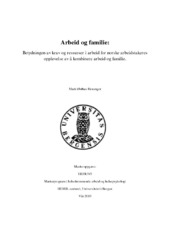| dc.description.abstract | Background: Work-family conflict is related to poor psychological and physical health, absence and deterioration of relationship quality at home. Work-life balance is related to improved well-being, motivation and productivity. Objectives: To examine the relation of demands and resources at work and work-family conflict and work-family balance based on the job demands-resources model. Material and method: The analyses were conducted on the basis of data from European Social Survey Round 5 2010/2011. The sample used consisted of Norwegian workers with at least one child living at home. Hierarchical multiple regression analyses were conducted, in order to examine the significance of demands and resources related to both directions of work-family conflict and work-family balance. Results: Work pressure, number of work hours and extended working hours are associated with work-family conflict. Opportunities for advancement and support from co-workers are associated with reduced work-family conflict. A secure job and a job which requires learning new things are associated with reduced family-work conflict. Number of working hours and extended working hours are associated with reduced work-family balance, while autonomy, support from co-workers, appropriately pay and the opportunity for advancement are associated with work-family balance. Conclusion: Demands at work have a great significance for both work-family conflict and work-family balance, and indicate that reducing demands at work can reduce conflict and promote a balance. Resources also have significance, and indicate that resources at work can reduce the level of conflict and promote a balance. | en_US |
